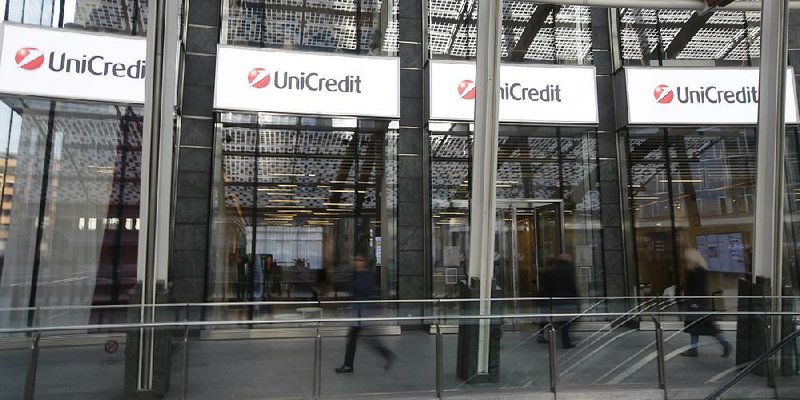MILAN -- Italy's largest bank, UniCredit, said Tuesday that it will unload $18.8 billion in soured loans, raise billions in new money and shed thousands of jobs as it seeks to restart the company under new management.
The move to reduce the bank's risks and cut costs emerged in a new strategic plan that includes increasing by 6,500 -- to 14,000 -- the number of jobs it will cut by 2019.
"We have developed a plan which is pragmatic, with tangible and achievable targets, which depends mostly on cost and risk management levers which are firmly under our control," CEO Jean Pierre Mustier said in a presentation to the financial community in London .
The CEO referred repeatedly to the plan as "self-help," saying it would create "a stronger, even better, more attractive bank."
Investors seemed to welcome UniCredit's plan, with shares in the bank jumping nearly 16 percent in Milan.
The relaunch was made after broad concerns about Italy's banking system, with speculation that one, Monte dei Paschi di Siena, might need a state bailout before the end of the year. Italy's banks are weighed down by some $382 billion in bad loans that won't be repaid because of the weak economy.
Italian Premier Paolo Gentiloni told Parliament ahead of a confidence vote in his new government Tuesday that Italy would be prepared "to intervene to guarantee the stability of the institutes and the savings of citizens."
Monte dei Paschi is only the most serious example. Small investors lost billions in two banks in the northern region of Veneto and four smaller central Italian banks, all of which have been taken over by a government-organized fund that salvaged the institutions but swallowed up private capital.
UniCredit is the country's biggest bank by assets and has significant operations outside Italy, accounting for 52 percent of its revenue, particularly in Austria and Germany, but it, too, has large amounts of bad loans that are festering on its balance sheets.
Mustier said the move to dispose of bad loans seeks "to improve and support recurring future profitability to become one of Europe's most attractive banks."
The bank forecast that it would make net income of $4.99 billion by the end of the 2016-2019 business-plan period and that its Core Tier 1 ratio, which provides a measure of a bank's health, would be above 12.5 percent, from 10.8 percent at the end of the third quarter this year.
The bad loans will be offloaded in two transactions in the first half of 2017 to new independent entities in which UniCredit will hold a minority interest.
The bank will book another $8.6 billion in provisions in the fourth quarter to cover bad loans, part of a total nearly $13 billion in one-time charges in the quarter.
The bank is asking shareholders to support a $13.8 billion capital increase, subject to a vote on Jan. 12. Under the business plan, shareholders will get no dividends in 2016, but the bank foresees an annual cash payout of 20 percent to 50 percent of earnings for the remaining period of the plan.
The capital-raising program is the bank's fourth since the financial crisis began in 2008, and by far the largest.
"The biggest future problem facing the bank isn't so much the restructuring program but the future growth prospects of the Italian economy, which are pretty poor," said Michael Hewson, chief market analyst at CMC Markets.
Since Mustier took over UniCredit in July, the bank has sold its Polish subsidiary Pekao and the Pioneer investment arm as well as a 30 percent stake in the Fineco Internet-banking business.
The plan calls for a focus on its retail and corporate clients in western Europe while it strengthens its position in central and eastern Europe. The job cuts will reduce personnel costs by $1. billion, with total annual cost savings expected at $1.8 billion.
Information for this article was contributed by Nicole Winfield of The Associated Press.
Business on 12/14/2016
